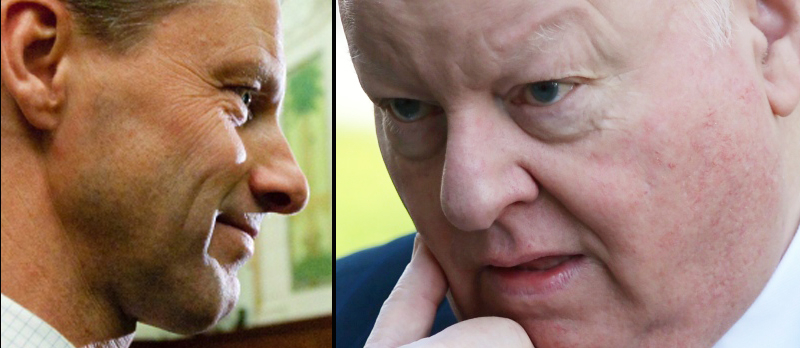Support strong Canadian climate journalism for 2025
OTTAWA — The moment has arrived for Nigel Wright to fill in the blanks on his controversial dealings with Sen. Mike Duffy, but the prime minister's former chief of staff won't be the only one with fresh details this week.
With Wright beginning his testimony Wednesday at Duffy's fraud, breach of trust and bribery trial, the defence team is expected to soon release hundreds of internal emails exchanged with Stephen Harper's key people.
Back on the first day of the trial in April, defence lawyer Donald Bayne threw that thick binder of evidence down on a courtroom table with a loud thump — a teaser of things to come. The full transcript of Wright's 2013 interview with police has also yet to be seen publicly.
Wright arrived Saturday in Ottawa from London, where he is a managing director with Onex Corp. A source close to Wright said the former chief of staff is ready for a full airing of the circumstances around his secret $90,000 payment of Duffy's improper living and travel expenses in 2013.
Wright takes his duty to the trial process seriously, said the source, speaking on condition of anonymity because they weren't authorized to discuss the matter.
Wright's mere presence at the trial, combined with the new exhibits, will breathe new life into a scandal that embroiled a number of people close to Harper — as well as some of his top Senate appointees — smack in the middle of an election campaign.
Harper has maintained he knew nothing about Wright's payment before it emerged in the media. But the scandal has also revolved around the political culture inside Harper's office and the efforts of his staff to make Duffy's expense controversy go away.
The Conservatives can at least count on the fact that Wright's previous statements to police suggest his main frustrations, even anger, were with Duffy. And Wright is still embraced inside Conservative circles — he was the guest of honour at a dinner held at the residence of the Commons Speaker a year ago that included the current campaign chairman, Guy Giorno.
When police declared in April 2014 that Wright would not face charges, he continued to insist — as he always has — that he was acting out of the best of intentions.
"I believed that my actions were always in the public interest and lawful,'' he said in a statement at the time. "The outcome of the RCMP's detailed and thorough investigation has now upheld my position.''
Wright told police during an interview two years ago that he was incensed that Duffy "was getting paid for meals he ate in his own house in Ottawa," according to the RCMP account.
"Because of his personal beliefs and financial ability, he took the personal decision at the time to pay back the $90,000," reads the police account.
"He did not view it as something out of the norm for him to do, and was part of being a good person."
Wright added that he also repaid because he felt Duffy "may have a technical argument as to whether he could claim living expenses."
That argument is central to Duffy's case on several other charges. Duffy filed for expenses on the basis that he was travelling and living away from his "principal" residence in Prince Edward Island, even though he lived most of the time in Ottawa. He maintains he operated within the Senate rules — and balked at Wright's attempts in early 2013 to have him repay expenses.
The Crown has made the case that it was Duffy who was an "equal partner" or "instigator" of a scheme that would see someone else repay the money, while he told the world he had.
Duffy's defence is that it was the other way around — Duffy was coerced into admitting that he had improperly collected expenses, even though he firmly believed he had done nothing wrong. Bayne has called it the "mistake-repay scenario."
Ironically, both Wright and Duffy might be looking forward to having more details on the table — to date, the media have only been able to see the information the RCMP chose to edit and release when building their case.
Wright's 2010 testimony to a parliamentary committee might offer some clues as to how he'll approach his testimony.
At the time, Wright had just been named Harper's new chief of staff, and he was putting his lucrative work at Onex on hold. Opposition MPs grilled him on how he would be able to maintain an "ethical wall" between his corporate work and the decisions he would be dealing with inside the PMO.
Wright declared the meeting a "good conversation," and answered even the most accusatory questions calmly. He said his first loyalty was to the "law of the land," and he noted how important his reputation was to him.
"I'm excited to come into public service, because I think I have something to offer and to contribute," Wright said.
"In no way will I put myself in a position of undoing what's taken 20 years to build."


Comments